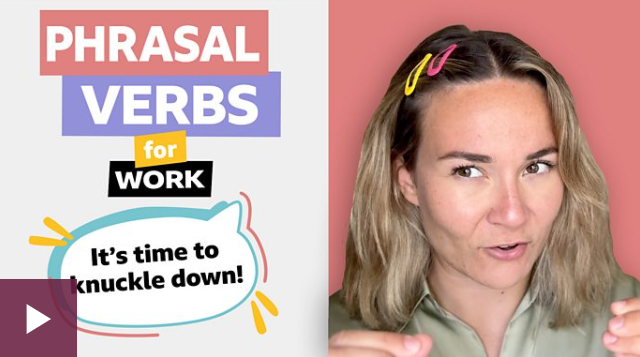Introduction
Georgie teaches you some phrasal verbs that can be used to talk about work.
Phrasal verbs mentioned
take (something) on
accept responsibility for a task or project, often in addition to one’s usual duties.
- She decided to take on a new project at work, even though she was already busy.
- He’s always willing to take on extra tasks to help the team.
come up with (something)
think of or create an idea, solution, or plan.
- She came up with a brilliant marketing strategy that boosted sales.
- We need to come up with a new approach to meet the deadline.
put (something) in
contribute something to achieve a goal
- He’s been putting in a lot of effort to improve his performance at work.
- They put in long days and weekends to complete the project before the deadline.
knuckle down
start working very hard, especially after a period of not doing much.
- Let’s get rid of all the distractions and knuckle down so I can get this project done.
- The team needs to knuckle down and focus if they want to finish the project on time.
get ahead
make progress and move past others, or complete your tasks earlier than expected
- She worked hard to get ahead in her career and eventually became a manager.
- In order to get ahead in this company, you need to be proactive and take initiative.
look into (something)
investigate, or get information before you take action
- The HR department is looking into the complaints made by the employees.
- We need to look into new software options to improve our workflow.
get back to (someone)
speak to someone again later to give them a reply after you’ve looked into something
- I’ll get back to you with more information after I discuss it with the team.
- Can you get back to the client about their inquiry as soon as possible?
TOP TIPS!
- If you see the word ‘something’, it usually means the verb requires an object.
- If ‘something’ is in the middle of the phrasal verb, it means that it can be separated by the object (but doesn’t have to be).
- If ‘something’ is at the end of the phrasal verb, it means it cannot be separated.
- When a pronoun, e.g. him, her, them, is the object of a separable phrasal verb, it must go between the verb and the particle.
